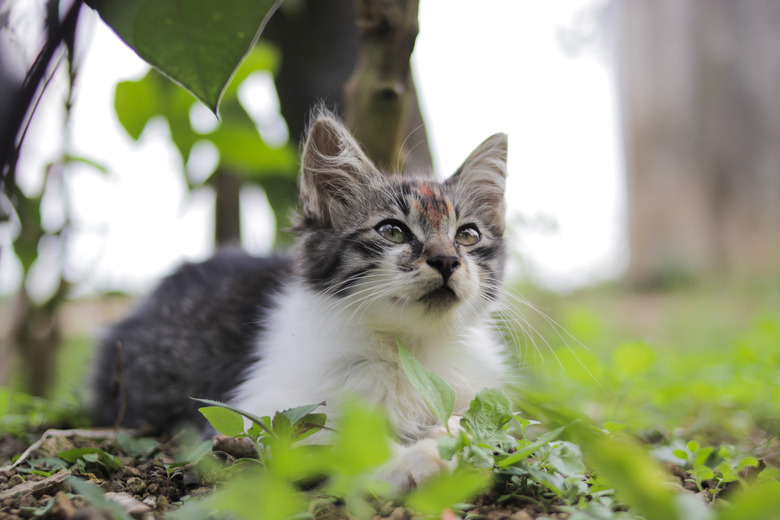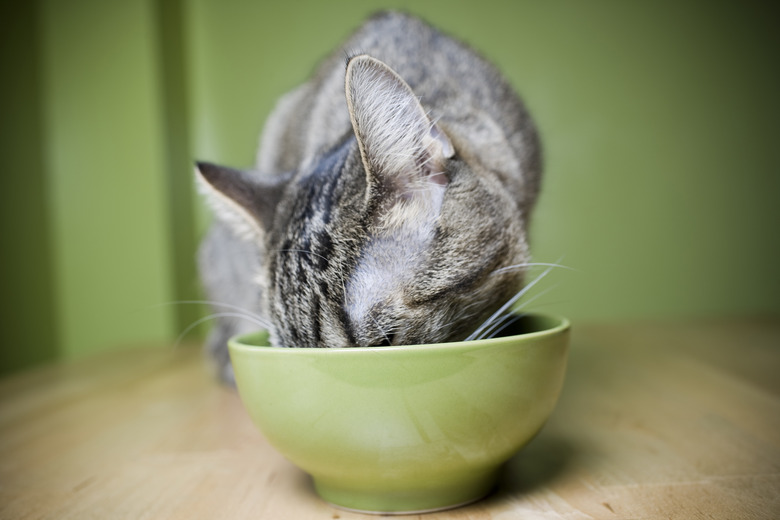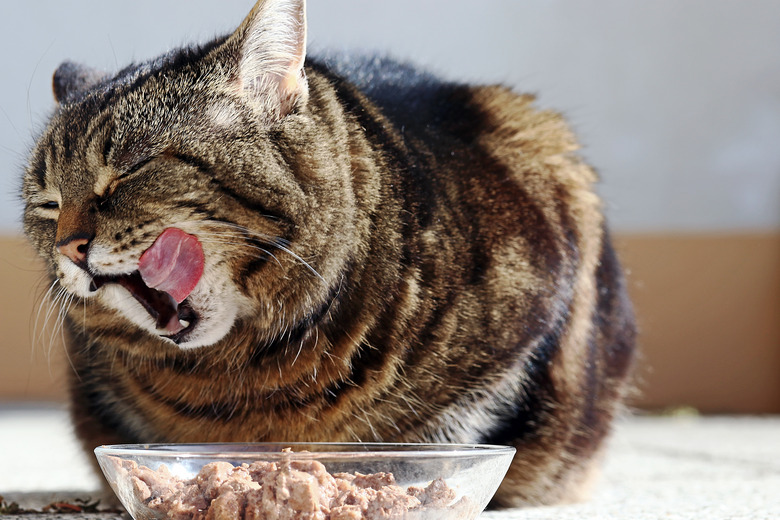Why Does My Cat Throw Up Dry Food?
Many cats are known to vomit up their dry food after eating. If you've ever wondered why your cat throws up dry food but not wet food, there are several possible reasons. Some common causes are hairballs, a sensitive stomach, and eating too fast. Observe your cat's actions during and after eating to narrow down the cause. You should also discuss any concerns about your cat's health with their veterinarian.
What's the difference between vomiting and regurgitation?
What's the difference between vomiting and regurgitation?
The difference between vomiting and regurgitation is that vomiting is the forceful expulsion of stomach contents, whereas regurgitation is food coming up from the esophagus. The difference between the two are described in more detail below.
Vomiting:
- You'll see your cat's belly heaving (called abdominal press) as part of the process.
- Cats who only eat dry food may vomit the food almost as soon as they finish eating. This is because once the dry food mixes with their stomach fluid, the food expands and causes discomfort.
- The food that's brought up may look like it's partially digested.
- Vomiting may be accompanied by nausea and drooling.
Regurgitation:
- There is no abdominal press because the food hasn't actually made it to the stomach. Food that is still in the throat (specifically the esophagus) is brought up.
- Your cat will bring up undigested food.
- There is no nausea or drooling.
- Something as innocuous as the shape of the dry food could cause regurgitation. Try different shapes of dry food to see if your kitty can keep pellet-shaped food down versus star-shaped or square pieces of kitty kibble.
Reasons a cat throws up after eating dry food
Reasons a cat throws up after eating dry food
There are a variety of reasons your cat may throw up after eating dry food, such as eating too quickly, needing to bring up a hairball, anxiety, and medical problems.
Eating too fast
Eating a meal too fast makes some cats vomit the food back up. By not chewing the food well enough, the cat increases their chances of throwing up. To slow down eating, keep pet siblings (both cats and dogs) separated if someone seems to be eating too fast because of stress or pressure exerted by household competition. You can also try slow-feeder cat bowls. These bowls are designed to slow down how fast your cat eats.
Coughing up hairballs
Longer-haired cats may throw up their food because there is an excessive amount of hair in their stomach from grooming themselves. This excess hair may not be exclusive to long-haired cats, but it is more likely to happen to them than to their shorter-haired feline companions.
To reduce the chances of hairball creation, brush your cat regularly to get rid of loose hair. There are also hairball gels and special foods made for hairball-prone cats.
Reducing stress and anxiety
Stress and anxiety may make your cat ill after eating. There could be a change in the cat's diet or the home environment that causes stress. Maybe someone is gone, or you've moved to a new home? Have you added a new pet or human family member to the household? Some cats get bullied by other cats around the food bowl. You may need to feed your cats separately.
Perhaps a neighborhood kitty is on the prowl outdoors and your cat could be stressed for territorial reasons. Look for other signs of stress, such as hair loss, hiding in new or strange places, or meowing loudly.
Allergies or illness
Your cat may be allergic to an ingredient in their dry food. Believe it or not, cats can be allergic to beef, chicken, fish, or dairy. Food allergies can be mild to severe. Corn or other grains can also be allergens. The good news is that there are special foods made for kitties with a sensitive stomach.
Other more serious reasons for a cat vomiting after eating dry food include:
- Intestinal parasites
- Kidney disease
- Hyperthyroidism
- Toxin ingestion or exposure
- Liver disease
- Stomach ulcers
- Gastrointestinal foreign body
- Constipation
- Inflammatory bowel disease
- Pancreatitis
- Immune system disorders
- Diabetes
- Cancer of an internal organ, such as the stomach or intestines
It's important to get veterinary help if vomiting becomes chronic or if your pet develops other symptoms. Always check with a veterinarian to figure out the best course of action for your pet.
Why does my cat throw up dry food but not wet?
Why does my cat throw up dry food but not wet?
If the ingredients are similar, then it's possible your cat throws up dry food because it expands in their stomach acid and causes discomfort. Dry food doesn't contain much moisture. Try wetting the dry food with some warm water or low-sodium broth (no garlic or onions) and feed them smaller amounts per meal. If that helps but is not enough, try feeding them smaller meals more frequently. So, instead of one big meal a day, divide your cat's food into two or three meals.
How do I get my cat to stop throwing up after eating?
How do I get my cat to stop throwing up after eating?
The solution depends on the reason for throwing up. Hairballs can be treated with small amounts of hairball gel, such as Laxatone; adding some hairball food to their regular diet; or completely transitioning your cat to a specially formulated pet food for hairballs.
Stress can be treated by determining the stressor and trying to lessen it. For illnesses, see your veterinarian, as excessive vomiting can be a sign of something more serious. In addition to a physical exam, your cat may also need to have bloodwork and X-rays.
Should I be worried if my cat throws up after eating?
Should I be worried if my cat throws up after eating?
Whether you should be worried depends on whether your cat's vomiting is frequent or occasional. If your cat just vomits once every few months, they're probably OK, but if they're vomiting multiple times in a month or — even worse — multiple times in a day, contact your veterinarian right away.
Cat owners should also be concerned if their pet is losing weight or if there are changes in behavior, eating habits, drinking habits, or stool.
The bottom line
The bottom line
If you've ever wondered, "Why is my cat throwing up after eating dry food?" there are a variety of possible reasons. It can be due to food allergies, hairballs, or a new food that doesn't sit well with your cat's digestive tract. If your cat vomits frequently, such as multiple times a month or multiple times a day, there could be a serious problem, such as kidney disease or a foreign object causing a blockage in their GI tract. Pet parents should contact their veterinarian right away if they notice their cat frequently has an upset stomach or other signs of illness.


